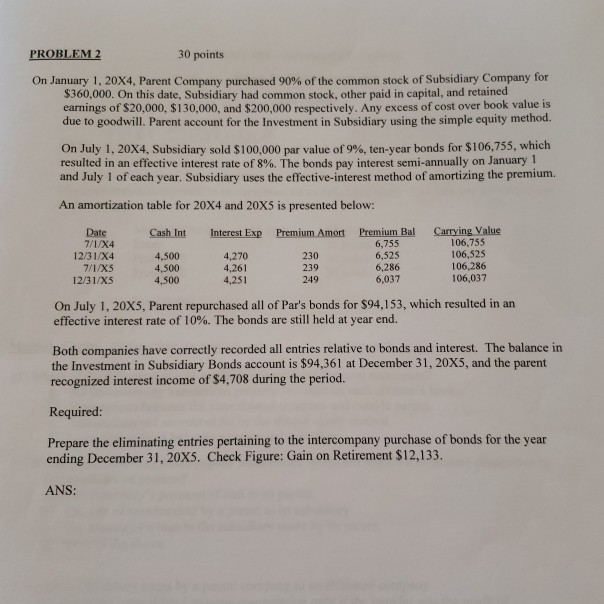Answered step by step
Verified Expert Solution
Question
1 Approved Answer
PROBLEM 2 30 points On January 1, 20X4, Parent Company purchased 90% of the common stock of Subsidiary Company for $360,000. On this date, Subsidiary

PROBLEM 2 30 points On January 1, 20X4, Parent Company purchased 90% of the common stock of Subsidiary Company for $360,000. On this date, Subsidiary had common stock, other paid in capital, and retained earnings of $20,000, $130,000, and $200,000 respectively. Any excess of cost over book value is due to goodwill. Parent account for the Investment in Subsidiary using the simple equity method. On July 1, 20X4, Subsidiary sold $100.000 par value of 9%, ten-year bonds for $106,755, which effective interest rate of 8%. The bonds pay interest semi-annually on January 1 and July 1 of each year. Subsidiary uses the effective interest method of amortizing the premium. An amortization table for 20X4 and 20x5 is presented below: Cash Int Interest Exp Premium Amort Date 7/1/X4 12/31/X4 7/1/XS 12/31/XS 4,500 4,500 4,500 4.270 4,261 4,251 230 239 249 Premium Bal 6,755 6,525 6.286 6,037 Carrying Value 106,755 106,525 106,286 106,037 On July 1, 20X5, Parent repurchased all of Par's bonds for $94,153, which resulted in an effective interest rate of 10%. The bonds are still held at year end. Both companies have correctly recorded all entries relative to bonds and interest. The balance in the Investment in Subsidiary Bonds account is $94,361 at December 31, 20X5, and the parent recognized interest income of $4,708 during the period. Required: Prepare the eliminating entries pertaining to the intercompany purchase of bonds for the year ending December 31, 20X5. Check Figure: Gain on Retirement $12,133. ANS: PROBLEM 2 30 points On January 1, 20X4, Parent Company purchased 90% of the common stock of Subsidiary Company for $360,000. On this date, Subsidiary had common stock, other paid in capital, and retained earnings of $20,000, $130,000, and $200,000 respectively. Any excess of cost over book value is due to goodwill. Parent account for the Investment in Subsidiary using the simple equity method. On July 1, 20X4, Subsidiary sold $100.000 par value of 9%, ten-year bonds for $106,755, which effective interest rate of 8%. The bonds pay interest semi-annually on January 1 and July 1 of each year. Subsidiary uses the effective interest method of amortizing the premium. An amortization table for 20X4 and 20x5 is presented below: Cash Int Interest Exp Premium Amort Date 7/1/X4 12/31/X4 7/1/XS 12/31/XS 4,500 4,500 4,500 4.270 4,261 4,251 230 239 249 Premium Bal 6,755 6,525 6.286 6,037 Carrying Value 106,755 106,525 106,286 106,037 On July 1, 20X5, Parent repurchased all of Par's bonds for $94,153, which resulted in an effective interest rate of 10%. The bonds are still held at year end. Both companies have correctly recorded all entries relative to bonds and interest. The balance in the Investment in Subsidiary Bonds account is $94,361 at December 31, 20X5, and the parent recognized interest income of $4,708 during the period. Required: Prepare the eliminating entries pertaining to the intercompany purchase of bonds for the year ending December 31, 20X5. Check Figure: Gain on Retirement $12,133. ANS
Step by Step Solution
There are 3 Steps involved in it
Step: 1

Get Instant Access to Expert-Tailored Solutions
See step-by-step solutions with expert insights and AI powered tools for academic success
Step: 2

Step: 3

Ace Your Homework with AI
Get the answers you need in no time with our AI-driven, step-by-step assistance
Get Started


